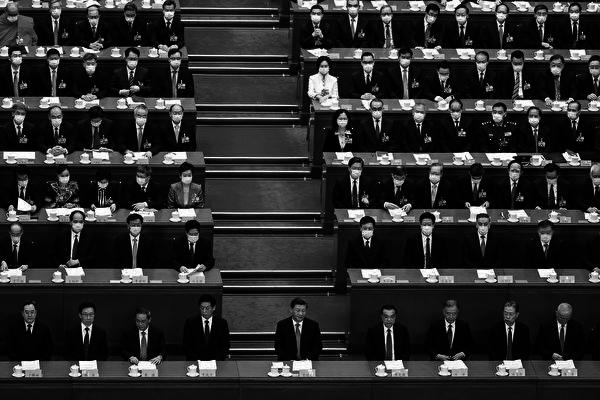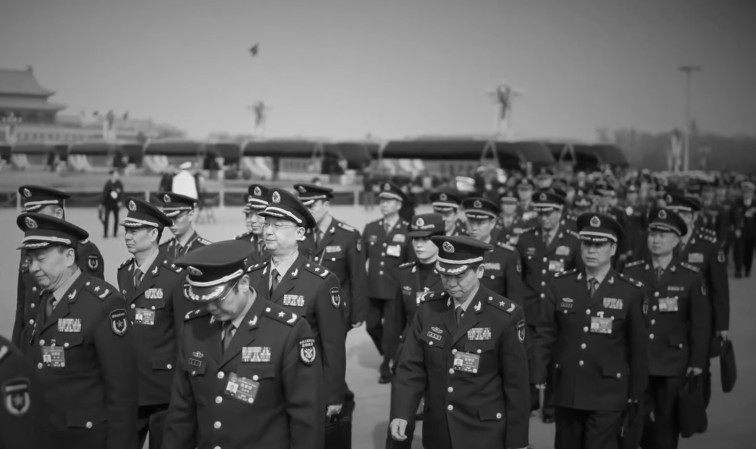In the early hours of the opening day of the Two Sessions this March, two massive fireballs streaked across the night sky in Beijing, falling from the sky and exploding mid-descent. (Image from the internet)
[People News] The annual Beidaihe moment for Beijing’s leadership is approaching. As always, Beidaihe serves as a window into potential shifts in power within Zhongnanhai. Although the Chinese Communist Party (CCP) leadership maintains a façade of political stability, the idea of a “post-Communist China”—a China without the Communist Party—has now been openly presented to the public.
As early as July, signs of heightened security appeared in Beidaihe: more checkpoints, the presence of armed police. One of the mysterious features of the Beidaihe meeting is that no major political figure is ever seen publicly in the area; their presence is only revealed after their "vacation" ends. Prior to their arrival, authorities even inspect shops for knives and scissors, requiring all blades to be locked and secured with wire. The entire security atmosphere turns grim and oppressive.
Whether this year’s Beidaihe meeting will trigger political upheaval remains to be seen. But the vision of a “China without the Communist Party” is now squarely on the table.
“The vast majority of people in today’s world live without Communist dictatorship or other forms of political despotism,” says Professor Wu Guoguang, Senior Research Fellow at Stanford University’s Centre on China’s Economy and Institutions. This prominent Chinese political scientist has been repeatedly advocating for a path toward a post-CCP China. In an in-depth interview for the Q3 2025 edition of China Democracy Quarterly, Wu explored this topic at length.
Professor Wu explained: “Why is ‘moving toward a post-Communist China’ a trend? Because from a global, historical perspective, the Communist system has already collapsed worldwide for over 30 years. There is ample historical evidence showing the flaws, crimes, disasters, and inherent unsustainability of Communist regimes.”
He pointed out that China’s current economic crisis is not just the result of specific economic policies. It’s rooted in a systemic contradiction between one-party autocracy and monopoly on political power versus market economy mechanisms. This institutional dilemma is embedded in the very design of the “China Model.”
Wu elaborated: “During Hu Jintao’s era, this dilemma was already evident—state encroachment on the private sector, serious employment issues, etc. Hu couldn’t solve them. But at least he didn’t intensify the suppression of the few factors that could have helped relieve the crisis. Xi Jinping, on the other hand, went in the opposite direction—cracking down on exactly those factors. Private enterprises could have helped, but he’s been aggressively suppressing them. The West was already frustrated with China’s unfair trade practices, yet Xi adopted an openly combative ‘wolf warrior’ stance. The core reason behind all this is to prevent private economic power and foreign influence from threatening or challenging the Party’s monopoly. This takes us back to the fundamental contradiction of the China Model—it’s clearly unsustainable. And Xi Jinping’s rule has only accelerated its collapse.”
Wu Guoguang further stated that after more than a decade of Xi’s rule, the Chinese people have now seen both the promises and the failures of the Communist system. For China to have any hopeful future, it must exit the Communist framework. That means moving toward a post-CCP China.
In Wu’s view: “The significance of a post-Communist China lies in building a system where power is constrained and individual rights are protected. In such a system, the economy can sustain long-term growth, development outcomes can benefit the people, and social order can remain stable without the fear that everything might suddenly change just because a new leader or new policy emerges.”
Meanwhile, on July 16, the Hudson Institute released a report authored by Professor Miles Yu Maochun. The report stressed that the fall of the CCP is not a matter of ‘if’ but ‘when’—and perhaps the most frightening part is that it may not collapse gradually, but overnight.
The Hudson report clearly states: the U.S. has already written and rehearsed a complete response plan. Every department is prepared. Washington’s “China script” has long been drafted in detail. The U.S. is not passively waiting for the CCP to fall—it is simply waiting for the right moment to act, to ensure that China does not fall into another authoritarian abyss.
The report emphasises that the U.S. will join forces with Taiwan, Japan, South Korea, Australia, the United Nations, the Five Eyes Alliance, and even India to form a “multilateral stability coalition” to jointly safeguard a peaceful transition in China. △










News magazine bootstrap themes!
I like this themes, fast loading and look profesional
Thank you Carlos!
You're welcome!
Please support me with give positive rating!
Yes Sure!